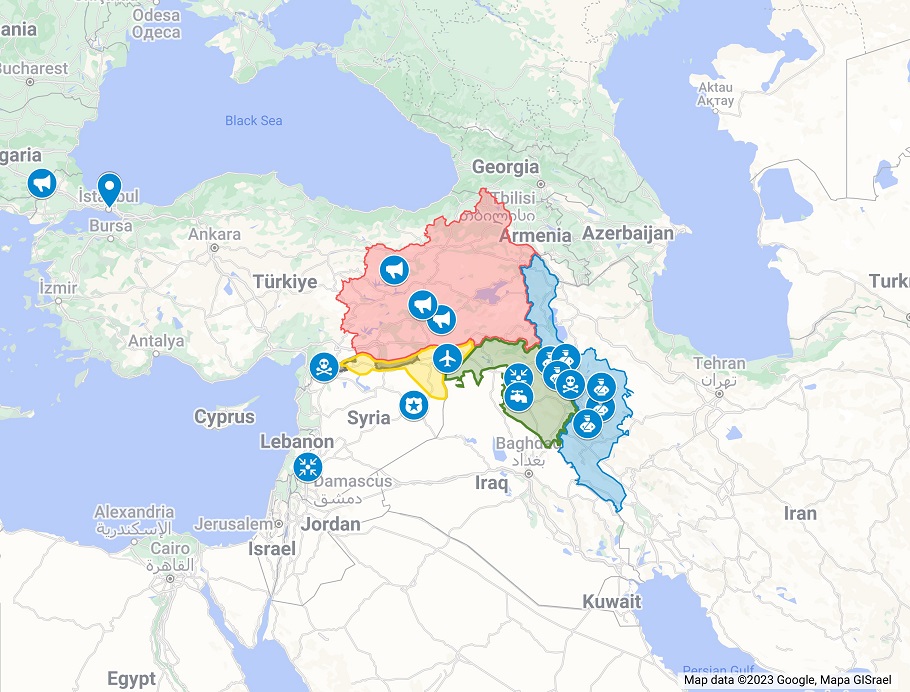1.2K
A weekly brief of events occurred in the Kurdistan regions of Iran, Iraq, Syria, and Turkey.
Iran
- The Hengaw Organization for Human Rights reported that Iranian authorities arrested 31 Kurds, including youth, teachers, physicians, and religious figures, on activism-related charges in April. The regime’s security forces continued to crackdown on dissent in Iranian Kurdistan last week, arresting two Kurdish men in Piranshahr, an activist in Senna, two men in Diwandarah, and an 18-year-old in Mehabad. Additionally, a Dewalan court sentenced a Kurdish imam to seven and half months in prison and 70 lashes and a religious figure from Jwanro (Javanrud) to three years in prison on charges of “propaganda against the regime” for supporting anti-government protests. A Piranshahr court sentenced three Kurds to 11 months in prison on charges related to protests. In Mehabad, a member of the Red Crescent was sentenced to seven and a half years in prison. In Senna, an activist named Muslim Saedpour received a one-year sentence for organizing a public ceremony commemorating Newroz. Separately, poison gas attacks on girls’ schools in Senna, Tehran, Kermanshah, and Baneh sickened several students. Lastly, the regime executed two people for blasphemy and has hanged 25 Balochis during the past two weeks.
Iraq
- U.S. Assistant Secretary of State for Near Eastern Affairs Barbara Leaf visited Iraq and met with several high-ranking officials. Leaf stressed the importance of Kurdish unity and reaffirmed the U.S.’s commitment to a secure, stable, and sovereign Iraq. On Monday, Prime Minister of Kurdistan Region Masrour Barzani, who is a member of the Kurdistan Democratic Party (KDP), met with his deputy, the Patriotic Union of Kurdistan’s (PUK) Qubad Talabani, to discuss resolving several disputes and mending the ongoing rift between the two parties. The KDP and the PUK are now planning to meet and attempt to resolve differences regarding minority quotas and several other election laws. That said, all of Iraqi Kurdistan’s major political parties have agreed to hold parliamentary elections on November 16.
- On Wednesday, Iraqi Oil Minister Hayan Abdel Ghani said oil exports from Iraqi Kurdistan would resume within two weeks. The ongoing pause on Iraqi Kurdistan’s exports, which has now lasted six weeks, also affects the Baghdad-controlled exports from Kirkuk. On May 2, the State Organization for Marketing Oil (SOMO) released statistics indicating zero barrels of oil were exported from Kirkuk in April. Separately, Iraqi Minister of Trade and Industry Atheer al Ghurairy revealed talks are underway between Iraq and Syria to revive the Baniyas pipeline, which might serve as an alternative to Turkey’s Cehan pipeline.
Syria
- The Arab League ended the Syrian government’s 12-year suspension for cracking down on protesters and readmitted it on May 7. The U.S. criticized the move, but numerous regional states, including Saudi Arabia, which has encouraged the “Arab nation” to welcome Syrian President Bashar al Assad’s regime back, have moved quickly to restore relations and reopen embassies. Concurrently, the Syrian Democratic Council (SDC) welcomed “any international and Arab interest in the Syrian issue if such efforts would count as the tragedy of the Syrians, which cannot end without an integrated political process.” Moreover, Turkish President Recep Tayyip Erdogan and his election opponent, Kemal Kilicdaroglu, have both announced plans to normalize relations with the Assad regime. Finally, Iranian President Ebrahim Raisi met with Assad in Damascus to discuss ongoing strategic cooperation between the two nations.
- The Syrian Democratic Forces (SDF) have reported the arrest of three ISIS (Da’esh) terrorists and one suspect in two separate operations, with support from the US-led coalition. The SDF also announced the death of two of its members due to a Turkish drone strike near Tel Hamis on May 5. The Kurdish-led SDF has accused Turkey of providing “a platform for the terrorist organization to revive itself.” The two personnel were guards of the al Hol camp for Da’esh detainees. In Afrin, which has been under Turkish occupation since 2018, a new settlement with 500 homes built on Kurdish lands using funds from Qatari and Palestinian groups has opened. Meanwhile, Turkish-backed armed groups are continuing to arrest Kurds and demand ransom.
Turkey
- The jailed Kurdish politician Selahattin Demirtas has publicly announced his support for the opposition candidate for presidency, Kemal Kilicdaroglu. Demirtas has called on his supporters to vote for Kilicdaroglu in the presidential race and the Green Left Party (YSP) in the parliamentary elections, stating “Let’s finish in the first round.” The Pro-Kurdish Peoples’ Democratic Party (HDP) is running in the election under the newly established YSP umbrella, as they are currently facing closure by the government. The YSP has continued to hold massive public events for the elections, including rallies in Kurdish provinces and Istanbul, less than a week before the critical elections. According to the HDP, 295 party members were detained last month. Last week, the Turkish police detained more people in Hatay, Istanbul, and Dersim and confiscated a media outlet named “Yeni Demokrasi Newspaper.” Additionally, in the latest hate crime, a Kurdish street singer named Cihan Aymaz was stabbed to death after refusing to sing a nationalist Turkish song that was requested by a racist man in Istanbul. The victim had been facing lawsuits for promoting Kurdish culture and music.

